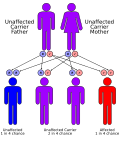Acheiropodia
| Acheiropodia | |
|---|---|
| Synonyms | N/A |
| Pronounce | N/A |
| Specialty | N/A |
| Symptoms | Congenital absence of hands and feet |
| Complications | N/A |
| Onset | Birth |
| Duration | Lifelong |
| Types | N/A |
| Causes | Genetic mutation |
| Risks | N/A |
| Diagnosis | Clinical examination, Genetic testing |
| Differential diagnosis | N/A |
| Prevention | N/A |
| Treatment | Supportive care |
| Medication | N/A |
| Prognosis | N/A |
| Frequency | Rare disease |
| Deaths | N/A |
Acheiropodia is a rare genetic disorder characterized by the congenital absence of hands and feet. This condition is inherited in an autosomal recessive pattern and is caused by mutations in the LMBR1 gene.
Presentation[edit]
Individuals with acheiropodia are born without hands and feet, a condition known as amelia. The absence of these limbs is due to a disruption in the normal development of the limb bud during embryogenesis.
Genetics[edit]
Acheiropodia is caused by mutations in the LMBR1 gene, which is located on chromosome 7. This gene is involved in the sonic hedgehog signaling pathway, which plays a crucial role in the development of limbs. The condition follows an autosomal recessive inheritance pattern, meaning that an individual must inherit two copies of the mutated gene, one from each parent, to be affected.
Diagnosis[edit]
Diagnosis of acheiropodia is primarily based on clinical examination and the characteristic absence of hands and feet. Genetic testing can confirm the diagnosis by identifying mutations in the LMBR1 gene.
Management[edit]
There is no cure for acheiropodia, and management focuses on supportive care to improve the quality of life for affected individuals. This may include the use of prosthetic devices, physical therapy, and occupational therapy to enhance mobility and independence.
Epidemiology[edit]
Acheiropodia is an extremely rare condition, with only a few cases reported in the medical literature. It is more commonly observed in certain isolated populations where consanguinity is more prevalent.
See also[edit]
References[edit]
<references />
External links[edit]
Acheiropodia[edit]
-
Autorecessive
-
Acheiropodia Mutation
-
Acheiropodia Chromatin Architecture (TAD)
Ad. Transform your life with W8MD's Budget GLP-1 injections from $75


W8MD offers a medical weight loss program to lose weight in Philadelphia. Our physician-supervised medical weight loss provides:
- Weight loss injections in NYC (generic and brand names):
- Zepbound / Mounjaro, Wegovy / Ozempic, Saxenda
- Most insurances accepted or discounted self-pay rates. We will obtain insurance prior authorizations if needed.
- Generic GLP1 weight loss injections from $75 for the starting dose.
- Also offer prescription weight loss medications including Phentermine, Qsymia, Diethylpropion, Contrave etc.
NYC weight loss doctor appointmentsNYC weight loss doctor appointments
Start your NYC weight loss journey today at our NYC medical weight loss and Philadelphia medical weight loss clinics.
- Call 718-946-5500 to lose weight in NYC or for medical weight loss in Philadelphia 215-676-2334.
- Tags:NYC medical weight loss, Philadelphia lose weight Zepbound NYC, Budget GLP1 weight loss injections, Wegovy Philadelphia, Wegovy NYC, Philadelphia medical weight loss, Brookly weight loss and Wegovy NYC
|
WikiMD's Wellness Encyclopedia |
| Let Food Be Thy Medicine Medicine Thy Food - Hippocrates |
Medical Disclaimer: WikiMD is not a substitute for professional medical advice. The information on WikiMD is provided as an information resource only, may be incorrect, outdated or misleading, and is not to be used or relied on for any diagnostic or treatment purposes. Please consult your health care provider before making any healthcare decisions or for guidance about a specific medical condition. WikiMD expressly disclaims responsibility, and shall have no liability, for any damages, loss, injury, or liability whatsoever suffered as a result of your reliance on the information contained in this site. By visiting this site you agree to the foregoing terms and conditions, which may from time to time be changed or supplemented by WikiMD. If you do not agree to the foregoing terms and conditions, you should not enter or use this site. See full disclaimer.
Credits:Most images are courtesy of Wikimedia commons, and templates, categories Wikipedia, licensed under CC BY SA or similar.
Translate this page: - East Asian
中文,
日本,
한국어,
South Asian
हिन्दी,
தமிழ்,
తెలుగు,
Urdu,
ಕನ್ನಡ,
Southeast Asian
Indonesian,
Vietnamese,
Thai,
မြန်မာဘာသာ,
বাংলা
European
español,
Deutsch,
français,
Greek,
português do Brasil,
polski,
română,
русский,
Nederlands,
norsk,
svenska,
suomi,
Italian
Middle Eastern & African
عربى,
Turkish,
Persian,
Hebrew,
Afrikaans,
isiZulu,
Kiswahili,
Other
Bulgarian,
Hungarian,
Czech,
Swedish,
മലയാളം,
मराठी,
ਪੰਜਾਬੀ,
ગુજરાતી,
Portuguese,
Ukrainian


